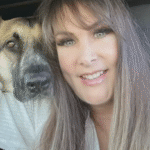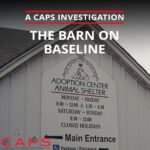
Companion Animal Protection Society (CAPS)
Pet Shop Campaigns
West Hollywood Ordinance
Following a CAPS undercover investigation of West Hollywood pet shops and a nearly six month protest of Elite Animals, the West Hollywood City Council passed an ordinance in February prohibiting the sale of dogs and cats in pet shops, with an exemption for the adoption of shelter and rescue animals. Media coverage of CAPS and the West Hollywood ordinance included The New York Times, Los Angeles Times, ABC, NBC and CBS in Los Angeles, About.com. In fact, media throughout the U.S. and the world (even New Zealand) covered this compelling story. Our work has inspired other towns and states to consider similar legislation.
CAPS is currently working with Animal Legal Defense Fund (ALDF) on an ordinance for La Mesa (San Diego County), CA and assisted Richmond, British Columbia animal advocates on a by-law banning the sale of pet shop dogs.
A CAPS investigation of West Hollywood-based Elite Animals revealed that the store was selling puppy mill dogs and defrauding customers. Undercover footage shot by a CAPS investigator showed employees telling the investigator that the puppies came from “good private breeders.” Elite Animals was also selling dogs from puppy mills in Russia and violating a federal law prohibiting the import of dogs under the age of six months for resale.
The main suppliers to Elite Animals were Gerry and Angie Wensmann, USDA licensed brokers in Minnesota, who sell to pet shops all over the country. Elite Animals proudly displayed a photograph of Governor Arnold Schwarzenegger, to whom the pet shop sold a Wensmann puppy in 2000. CAPS investigations of the Wensmann puppy mill documented sick and injured animals in need of veterinary care, substandard housing with badly stained flooring, broken wood and jagged rusty wires that posed a danger to the dogs, green algae water, rusting, filthy feeders with soggy food, fecal and urine accumulation, and dogs whose feet were slipping through wire flooring. The Wensmanns also breed cats in buildings that CAPS has been unable to access. A 2008 USDA inspection stated that kittens were panting in 95 degree heat in a trailer house. Yet despite CAPS investigation evidence presented to USDA and USDA reports with serious violations, USDA has not taken action. We are very encouraged, though, that evidence from CAPS investigations led to the ordinance.
Four Pet Shops in the Los Angeles Area Went Humane in Just Eight Months
CAPS is very proud to announce that Aquarium & Pet Center in Santa Monica, California signed a legal agreement to convert to a humane business model. In late October of 2009, this pet store, which has been in business for over 20 years, decided to stop selling puppies from mills. Aquarium & Pet Center now works with rescue organizations to promote adoptable animals from the Los Angeles municipal shelter system. The store adopted out a number of animals in 2010 and serves as a model for humane stores.
Aquarium & Pet Center had been the target of an ongoing CAPS investigation linking the store to The Hunte Corporation, the largest USDA licensed dog brokering facility in the country. CAPS is quite familiar with the practices of Hunte as the result of an undercover employment investigation at this large facility and ongoing investigations of Hunte’s puppy mill suppliers. In addition to dogs supplied from inhumane breeding facilities in the Midwest, some of the puppies sold at Aquarium & Pet Center were from a puppy mill just outside of Los Angeles. This was the fourth store in Los Angeles to succumb to investigations and protests by CAPS between March 2009 and November 2009. Other stores no longer selling puppy mill dogs include Elaine’s Pet Depot, Elite Animals, and Pets of Wilshire. Elaine’s Pet Depot, part of a chain in the U.S. and Canada, offers rescue animals for adoption. On the basis of our efforts against Elaine’s, the entire Pet Depot chain stopped selling dogs and cats (some didn’t before).
CAPS had organized three weekend protests in front of Aquarium & Pet Center. On October 10, the protest was interrupted by violence when dozens of animal rights activists were shot at by an unknown assailant with a high powered air rifle, spraying them with two millimeter brass slugs. Two of the protesters were slightly injured. The police investigation into the shooting is ongoing and there is a $5000 reward for any information leading to the arrest and conviction of the shooter.
But our work in Los Angeles has just begun. We hope to convert more pet shops to humane stores. We need to use our momentum to get ordinances passed in other towns and cities in Southern California, including Los Angeles, which will in turn generate even more interest across the country. An in-depth news story on the pet shop industry in the Los Angeles area is desperately needed, which requires that CAPS investigate pet shops and the mills that supply them.
Landmark Protests of Barkworks Inside a Shopping Mall
On 12/19/09, the busiest shopping day of the year, CAPS held a landmark peaceful protest with 72 participants inside Westside Pavilion Mall in Los Angeles against one of seven Barkworks stores. This pet shop chain obtains puppies from mills, including some with serious USDA violations. The protest was a landmark demonstration for the California animal protection movement because pet shops that sell puppy mill dogs inside shopping malls had been immune to the increasing public outcry over the puppy mill issue. After researching California Supreme Court cases, we realized that the California Constitution, which is more expansive than the federal version, protected our rights to protest inside a mall – a de facto public forum under California case law. Moreover, California case law protects the rights of protesters to call for a boycott of a specific business within a shopping center or mall.
CAPS’ documentary about Barkworks and a customer who purchased a very sick puppy that died on 12/24, one week after purchase, was one of the most shared videos on CNN iReport in 2010. Following the release of this documentary, CAPS held a second protest on 2/13/10 with 89 participants inside the mall in honor of Valentine’s Day, a loveless day at Barkworks. The third protest on 4/13/10 had more than 100 participants, including 70 inner city public high school students. In lieu of signs, CAPS protesters wore tee shirts and carried large shopping bags – all with slogans or messages. CAPS worked closely with the LAPD, and all three times, officers provided protection of our First Amendment Rights in light of the mall’s threats to have security guards arrest the protesters. We will be holding another protest on 12/18/10. We are currently investigating Barkworks’ breeders and brokers in the Midwest. This investigative evidence will be presented to Los Angeles media and used for a lawsuit.
Happines is Pets, Chicago Area
Founded more than 25 years ago, Happiness is Pets is a six-store chain in the Chicago area that obtains puppies from puppy mills. CAPS has been receiving complaints about sick puppies from Happiness is Pets stores for about 20 years. Some of these stores were protested during nationwide pet shop protests we held in the early 1990’s. We worked on a four-part pet shop/puppy mill series with FOX News Chicago in 1995 that featured customers who had purchased sick Happiness is Pets puppies.
Many of the puppies at Happiness is Pets stores come from USDA-licensed facilities in Iowa that CAPS has investigated, including large-scale broker/breeder Steve Kruse. We have also investigated unlicensed Amish breeders in Indiana that supply puppies to Happiness is Pets through Levi Graber, a USDA-licensed broker in Bloomfield, Indiana. CAPS will continue investigating breeders and brokers who provide puppies to Happiness is Pets.
CAPS sponsors protests on the second Saturday of each month at the Happiness is Pets in Arlington Heights and the last Saturday of each month at the Lombard location. For more information on Happiness is Pets, read the blog of CAPS Chicago Campaign Coordinator Ida McCarthy: http://activerain.com/blogsview/1363708/happiness-is-pets-the-truth
Pet Works, San Diego Area
Pet Works Pet Store in La Mesa, California (San Diego County) has been selling sick puppies for over 16 years. The owner, Richard Fuller claimed, “We only get our puppies from the most reputable USDA licensed breeders.” CAPS investigated some of these breeders, including Marjorie Walker, who had her broker’s license revoked by USDA and was a booking agent for The Hunte Corporation, where we worked undercover for six months in 2004. The notorious Wensmann kennel in Minnesota, investigated twice by CAPS and the main reason for the West Hollywood ordinance, still supplies puppies to Pet Works. In December, CAPS investigated Nebraska breeders and a broker.
Since January of 2009, CAPS-sponsored protests have taken place in front of the store every weekend to raise awareness in the community about the pet shop and puppy mill issue. Our presence there had made a difference. The San Diego Union Tribune reported on December 1 that Pet Works is going out of business by the end of the year. CAPS Advisory Board Member Sydney Cicourel, who organized the protests efforts, and West Coast Director Carole Davis were quoted in the article. Pet Works chose to shut its doors prior to CAPS’ protest with 40 activists on December 11. CAPS is still going forward with an ordinance banning the sale of pet shop puppies and kittens in La Mesa, which will be voted on by the City Council on December 14.
USDA Licensed Broker Kathy Bauck
CAPS began investigating Kathy Bauck, the owner and operator of “Pick of the Litter” in Minnesota, in 1997. Bauck, one of the largest USDA licensed dog brokers and breeders in the country, sold thousands of dogs to pet shops and Internet buyers all over the country.
Due to the efforts of the Companion Animal Protection Society, Bauck will no longer be able to sell to pet shops and other dog breeders and brokers. On August 13, 2009, the USDA/APHIS filed a Motion for Summary Judgment requesting the termination of Bauck’s license. It is rare for the agency to request the termination of a license, especially through the expedited means of a summary judgment. CAPS believes the use of a summary judgment was due to the pressure APHIS felt from our petition for rulemaking mandating that USDA automatically terminate a license upon an animal cruelty conviction. On September 29, the administrative law judge issued a decision and order in the Bauck case, granting APHIS’ motion for summary judgment. On October 29, Bauck appealed that decision to the judicial officer. APHIS filed a response to her appeal on November 18.
The Judicial Officer’s Order and Decision dated December 2, 2009 terminated Bauck’s license. This termination was stayed pending Bauck’s federal court appeal, which was denied. Bauck’s license was officially terminated in August 2010. It is unfortunate that Bauck was allowed to keep her license during this yearlong legal process.
The USDA had licensed Bauck since 1983, and despite CAPS investigations since 1997, the USDA did not take action. The July 2008 USDA inspection report for Bauck found no violations of the Animal Welfare Act (AWA). They did not inspect her again until March 4, 2009, just three weeks before her conviction. The inspector cited her for veterinary and cleaning violations.
CAPS has been investigating the USDA’s failure to enforce the AWA since 1995 and has been lobbying members of Congress for oversight hearings regarding USDA’s lax enforcement of the AWA. CAPS went to Capitol Hill in June 2009 to meet with USDA officials and congressional aides, using the Bauck case as evidence of the USDA’s dereliction of duty. CAPS’ pro bono lobbyists submitted a petition for rulemaking requesting that AWA regulations be amended to require the automatic revocation of a USDA license upon the conviction in a court of law of a licensee, such as Bauck, for animal cruelty.
Based on evidence from a CAPS undercover employment opportunity of six weeks, a jury convicted Bauck on March 24, 2009 of four misdemeanor counts of animal cruelty and torture. On May 1, 2009, in what CAPS and animal advocates consider a great miscarriage of justice, the judge sentenced Bauck on just one of the counts, which he wrongly believed encompassed the other charges. She received a 90-day sentence, reduced to 20 days (weekday work release at the sheriff’s discretion), a $500 fine (reduced from $1,000), 80 hours of community service and one year of probation.
While under a cease and desist order from the State Veterinary Board for the practice of veterinary medicine, including doing C-Sections on her dogs, Bauck continued to practice vet medicine, which was documented by her employees. However, the state allowed her to plea bargain for just one charge for the practice of veterinary medicine and dropped the cruelty charge for killing a puppy by bashing it against a pole. While on parole and serving work release, she continued to commit cruelty that was documented by a CAPS undercover investigator. CAPS submitted the investigator’s hidden camera footage, photographs and reports to local authorities. This documentary evidence was the basis of the criminal case against Bauck.
At the time of the investigator’s employment, Bauck’s facility held 900 adult dogs and approximately 400 puppies. The undercover video shot by the CAPS investigator shows dogs that are sick, wounded, and emaciated. Dogs at her facility commonly became wounded through fights, even some of the small breed dogs.
Bauck will still be able to sell dogs on the Internet. The Animal Welfare Act does not cover Internet breeders. However, if proposed legislation in Minnesota requiring state kennel licenses is passed, those convicted of animal cruelty and their business associates will be banned from obtaining a license. CAPS plans to investigate numerous Minnesota puppy mills to provide evidence in support of this legislation.
CAPS received a complaint about a sick puppy purchased at New York Kennel Club. The complaint states that Bauck sold the puppy to the pet shop after her USDA license termination on August 16. Interstate health certificates signed by Bauck show New York Kennel Club as both the consignor (Bauck’s Minnsota address) and consignee (pet shop address). CAPS plans to investigate.
The Bauck case made national headlines with coverage by CBS stations in Chicago, Minneapolis and Los Angeles. CBS Chicago had the exclusive interview and footage. ABC in Boston aired a number of reports on the Bauck case. Bauck sold dogs to several pet shops and to Internet buyers across the state of Massachusetts. CAPS is about to distribute a professionally produced documentary about the Bauck investigation, criminal animal cruelty case and USDA termination case to national media to generate stories about CAPS.
USDA’s Failure to Enforce the Animal Welfare Act/Office of Inspector General Report
CAPS is celebrating a major victory – one we have been working toward for many years! We hope that as a result of this victory, USDA’s APHIS/Animal Care, the division that oversees the inspection of thousands of federally licensed dog and cat breeding and brokering facilities, will implement significant changes with respect to enforcement of the Animal Welfare Act (AWA).
In late May, the Office of Inspector General for USDA released a scathing 69-page report for an audit and investigation conducted between 2006 and 2008. This audit and investigation was prompted by a meeting that CAPS and Crowell & Moring attorneys had with OIG officials in May 2006. The complete OIG report is available on our website at www.caps-web.org.
CAPS will continue to cooperate with USDA while conducting ongoing oversight of the Animal Care inspection program. Since 1995, CAPS has been to approximately 1,000 puppy mills, most of them USDA licensed. See the 2011 agenda for issues we plan to address with USDA in light of the OIG report.
Iowa Legislation
In March, Governor Chet Culver signed into a law a bill that requires state inspectors to go into USDA-licensed facilities after receiving a complaint. Iowa Voters for Companion Animals and the Animal Rescue League (ARL) used CAPS undercover footage of Iowa puppy mills in support of this legislation. CAPS and ARL have worked together on cooperative efforts for a number of years




